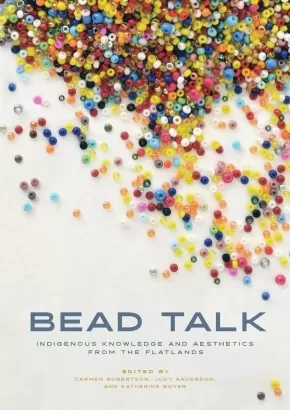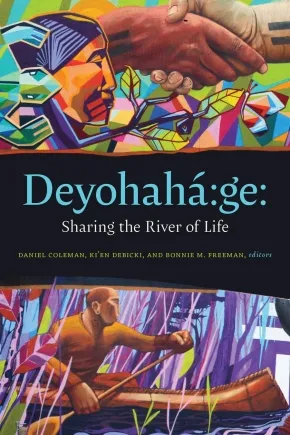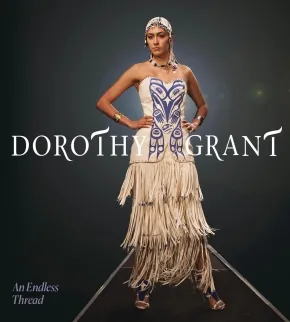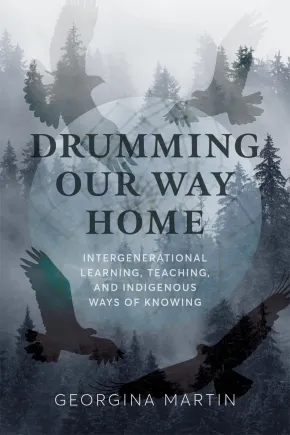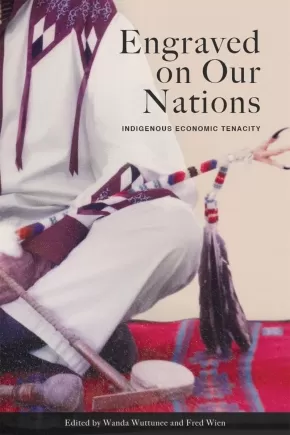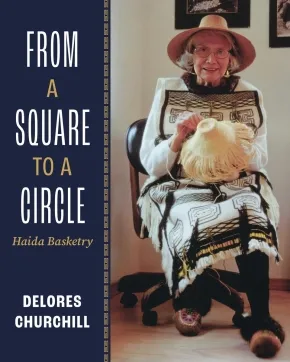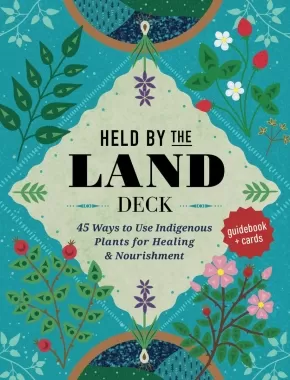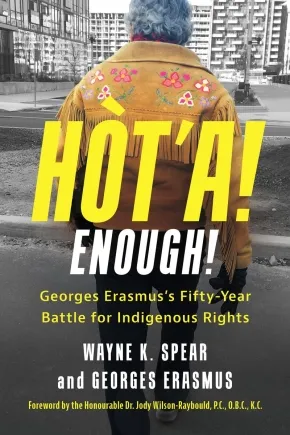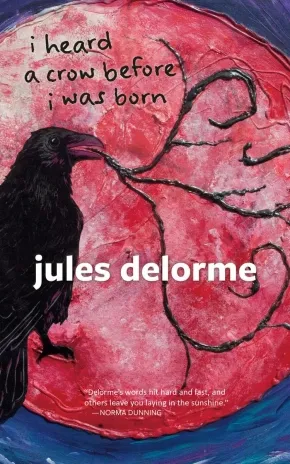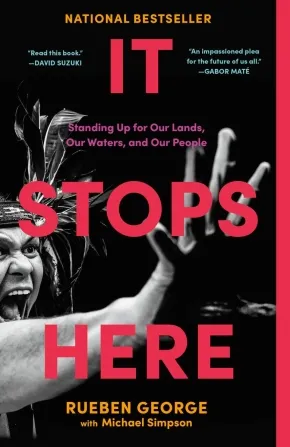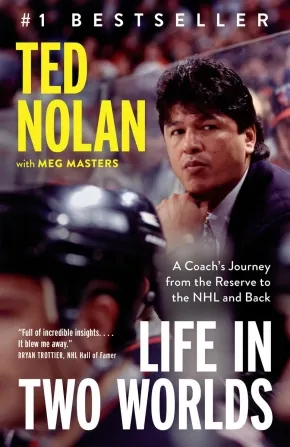
First Nations
46
-
60
of
342 Results;
Sort By
Go To
of 23
Bead Talk: Indigenous Knowledge and Aesthetics from the Flatlands
$27.95
Format:
Paperback
Text Content Territories:
Indigenous Canadian; First Nations; Métis;
Reading Level: N/A
ISBN / Barcode: 9781772840650
Synopsis:
Synopsis:
Sewing new understandings.
Indigenous beadwork has taken the art world by storm, but it is still sometimes misunderstood as static, anthropological artifact. Today’s prairie artists defy this categorization, demonstrating how beads tell stories and reclaim cultural identity. Whether artists seek out and share techniques through YouTube videos or in-person gatherings, beading fosters traditional methods of teaching and learning and enables intergenerational transmissions of pattern and skill.
In Bead Talk, editors Carmen Robertson, Judy Anderson, and Katherine Boyer gather conversations, interviews, essays, and full-colour reproductions of beadwork from expert and emerging artists, academics, and curators to illustrate the importance of beading in contemporary Indigenous arts. Taken together, the book poses and responds to philosophical questions about beading on the prairies: How do the practices and processes of beading embody reciprocity, respect, and storytelling? How is beading related to Indigenous ways of knowing? How does beading help individuals reconnect with the land? Why do we bead?
Showcasing beaded tumplines, text, masks, regalia, and more, Bead Talk emphasizes that there is no one way to engage with this art. The contributors to this collection invite us all into the beading circle as they reshape how beads are understood and stitch together generations of artists.
Reviews
“An evocative, aesthetically gorgeous book that is rich in knowledge, relationality, and experience. Curated with care, rooted in artistic practice and lived experience, and embodying a polyvocal, collaborative spirit, it immerses the reader in the world of Indigenous beadwork on the prairies. Bead Talk carries teachings about decolonial love, healing and medicine, cultural knowledges, political and theoretical modes of action, gendered experience, and more. I can’t think of any other book like this—it is a gift!” — Aubrey Hanson
Educator Information
Contributors: Ruth Cuthand, Dayna Danger, Sherry Farrell Racette, Marcy Friesen, Felicia Gay, Franchesca [Fran] Hebert-Spence, Audie Murray, Cathy Mattes.
Table of Contents
Foreword – Brenda Macdougall
Who We Are
Introduction – Carmen Robertson, Judy Anderson, and Katherine Boyer
Part I: Conversations
1. Mentoring/Beading – Ruth Cuthand and Marcy Friesen
2. mîkisistahêwin (bead medicine) – Judy Anderson and Audie Murray
3. Parallel Lines Move Along Together: A Beaded Line that Connects Me to You – Katherine Boyer and Dayna Danger
4. The Power of Gathering: Revisiting the Seeds of Ziigimineshin – Franchesca Hebert-Spence and Carmen Robertson
5. Beads, Blood, and Curating Ruth Cuthand’s Art – Felicia Gay and Carmen Robertson
Part II: Essays
6. “Until We Bead Again”: The BU Beading Babe and Embodying Lateral Love and Generous Reciprocity – Cathy Mattes
7. Visiting Kin: Indigenous Flatland Beading Aesthetics – Carmen Robertson
8. If the Needles Don’t Break and the Thread Doesn’t Tangle: Beading Utopia – Sherry Farrell Racette
Afterword: Spreading the Bead Love Far and Wide
Additional Information
240 pages | 6.00" x 8.50" | 62 colour illustrations | Paperback
Becoming a Matriarch (PB)
$23.00
Format:
Paperback
Text Content Territories:
Indigenous Canadian; First Nations; Dene; Dane-zaa (Dunne-za);
Reading Level: N/A
ISBN / Barcode: 9780385697798
Synopsis:
Synopsis:
When matriarchs begin to disappear, there is a choice to either step into the places they left behind, or to craft a new space.
Helen Knott’s bestselling debut memoir, In My Own Moccasins, wowed reviewers, award juries, and readers alike with its profoundly honest and moving account of addiction, intergenerational trauma, resilience, and survival. Now, with her highly anticipated second book, Knott exceeds the highest of expectations with a chronicle of grief, love, and legacy. Having lost both her mom and grandmother in just over six months, forced to navigate the fine lines between matriarchy, martyrdom, and codependency, Knott realizes she must let go, not just of them, but of who she thought she was.
Woven into the pages are themes of mourning, sobriety through loss, and generational dreaming. Becoming a Matriarch is charted with poetic insights, sass, humour, and heart, taking the reader over the rivers and mountains of Dane Zaa territory in Northeastern British Columbia, along the cobbled streets of Antigua, Guatemala, and straight to the heart of what matriarchy truly means. This is a journey through pain, on the way to becoming.
Through writing, reflecting, and dreaming I found my way to the real lessons.
I found permission to become whoever I needed to be.
I found permission to live a life and not just endure it.
I found permission to belong deeply to myself.
I found permission to lay to rest the sorrow of the women before me and to cultivate joy for us in its place.
Awards
- 2024 BC Book Awards - The George Ryga Award for Social Awareness in Literature winner
Reviews
“In enchantingly vivid language and with a compelling narrative arc, Helen Knott’s new masterpiece is a memoir of grief and joy, loss and rediscovery, flight and return and, above all, a paean to the beautiful, eternal, soothing and all-encompassing power of matriarchy.” —Gabor Maté MD, author of The Myth of Normal: Trauma, Illness and Healing in a Toxic Culture
“Knott lays out that which all Indigenous women know and feel on a cellular level—we are only here because of the women, the matriarchs, the warriors, the survivors, the courageous ones, the fierce ones, the loving ones who came before us. Beautifully, tenderly Knott maps out for the reader the intrinsic way Indigenous women lift up, celebrate and support one another. Even when no one else does. We always have each other. We see each other. We are each other’s medicine. And there is no greater gift. These are the stories Indigenous women must tell—the journeys, reclamation and place of matriarchs. Present in Knott’s words are paths to reconciliation for everyone.” —Nahanni Fontaine, Member of the Legislative Assembly of Manitoba
“Becoming a Matriarch is a vivid, lyrical exploration of womanhood, loss, grief, and eventually, self-love, braided together with radiance and wisdom. Knott brilliantly uses memory as a tool for self-exploration and growth. The land, dreams and body are in constant communication: ‘My body knows the mountains and rivers and berry bushes that it comes from.’ Throughout the book you can’t help but ask yourself, what does it mean to come from strong women and still allow yourself space to be loved? Becoming a Matriarch teaches us that joy can exist inside the cracks of the most tumultuous times in our lives and love can still bloom if we let it.” —Chelene Knight, author of Dear Current Occupant and Junie
“Becoming a Matriarch is a feast of remarkable, colourful, deep and profoundly raw storytelling. Helen Knott is one of the greatest Indigenous literary artists of our time.” —Brandi Morin, author of Our Voice of Fire: A Memoir of a Warrior Rising
Additional Information
224 pages | 5.18" x 8.00" | Paperback
Curve!: Women Carvers on the Northwest Coast
$45.00
Artists:
Format:
Hardcover
Text Content Territories:
Indigenous Canadian; First Nations;
Reading Level: N/A
ISBN / Barcode: 9781773272542
Synopsis:
Synopsis:
An eighty-year overview of wood and argillite carving by Indigenous women artists on the Northwest Coast.
Though women of the Northwest Coast have long carved poles, canoes, panels, and masks, many of these artists have not become as well known outside their communities as their male counterparts. These artists are cherished within their communities for helping to keep traditional carving practices alive, and for maintaining the dances, songs, and ceremonies that are intertwined with visual art production. This book, and an associated exhibition at the Audain Art Museum, gathers a range of sculptural formats by Indigenous women in order to expand the discourse of carving in the region.
Both the exhibition and publication are co-curated by Dana Claxton, artist, filmmaker and head of the University of British Columbia's Department of Art History, Visual Art and Theory; and Dr. Curtis Collins, the AAM's Director & Chief Curator. Commentaries by Skeena Reece, Claxton, and Marika Swan, and interviews with artists Dale Campbell and Mary Anne Barkhouse are presented alongside more than one hundred artworks from public and private collections across North America, including several newly commissioned pieces.
Featured artists include:
- Ellen Neel (Kwakwaka'wakw, 1916-1966) - Freda Diesing (Haida, 1925-2002) - Doreen Jensen (Gitxsan, 1933-2009) - Susan Point (Musqueam, b. 1952) - Dale Campbell (Tahltan, b. 1954) - Marianne Nicolson (Kwakwaka'wakw, b. 1969) - Arlene Ness (Gitxsan, b. 1970s) - Melanie Russ (Haida, b. 1977) - Marika Swan (Nuu-chah-nulth, b. 1982) - Morgan Asoyuf (Ts'msyen, b. 1984) - Cori Savard (Haida, b. 1985) - Cherish Alexander (Gitwangak, b. 1987) - Stephanie Anderson (Wetsuwet'en, b. 1991) - Veronica Waechter (Gitxsan, b. 1995)
Awards
- Winner of the 2025 Bill Duthie Booksellers' Choice Award
Additional Information
160 pages | 9.20" x 1.10" | 120 colour photos | Hardcover
Deyohaha´:ge: Sharing the River of Life
$34.99
Format:
Paperback
Text Content Territories:
Indigenous Canadian; First Nations; Haudenosaunee (Iroquois); Cayuga; Kanyen'keha:ka (Mohawk); Oneida (Onyota'a:ka); Onondaga; Seneca; Tuscarora;
Reading Level: N/A
ISBN / Barcode: 9781771126472
Synopsis:
Synopsis:
How people today create respectful relationships through peace and friendship.
Deyohahá:ge:, “two roads or paths” in Cayuga language, evokes the Covenant Chain-Two Row Wampum, known as the “grandfather of the treaties.” Famously, this Haudenosaunee wampum agreement showed how Indigenous people and newcomers could build peace and friendship by respecting each other’s cultures, beliefs, and laws as they shared the river of life.
Written by members of Six Nations and their neighbours, this book introduces readers not only to the 17th-century history of how the Dutch and British joined the wampum agreement, but also to how it might restore good relations today. Many Canadians and Americans have never heard of the Covenant Chain or Two Row Wampum, but 200 years of disregard have not obliterated the covenant. We all need to learn about this foundational wampum, because it is resurging in our communities, institutions, and courthouses—charting a way to a future.
The writers of Deyohahá:ge delve into the eco-philosophy, legal evolution, and ethical protocols of two-path peace-making. They tend the sacred, ethical space that many of us navigate between these paths. They show how people today create peace, friendship, and respect—literally—on the river of everyday life.
Reviews
"Deyohahá:ge: brilliantly reminds us of our obligations and responsibilities to one another, and the more-than-human world. It shows that pathways can only be forged by respecting the waters, earth, fires, and skies through which all creation travels.” - John Borrows, Loveland Chair in Indigenous Law, University of Toronto
Educator & Series Information
This book is part of the Indigenous Imaginings series.
Table of Contents
The Words That Come Before All Else
Acknowledgements
Introduction, Daniel Coleman, Ki’en Debicki, and Bonnie Freeman
Section One: Original Instructions
Gä•sweñta’ Reflections. Oren Lyons
Where the Roots Touch: tsi niyothahinen ne Tehontatenentshonteronhtáhkwa, Amber Meadow Adams
Wunnáumwash: Wampum Justice, Kelsey Leonard The Chain, Naturally Understood, Kayanesenh Paul Williams
Section Two: Learning from the River
Guswenta Space: An Invitation to Dialogue, David Newhouse
Navigating the Two Row in the Academy, Vanessa Watts
Two Rows of Reconciliation, Rick Hill
Below Decks in the Covenant: Blackness in the Two Row Tradition, Phanuel Antwi
Towards Peace: Living in the Three White Rows of the Two Row”, Sarah General
Section Three: Living on the River
The Pen Pal Project: Bridging the Divide with the Teachings of the Two Row Wampum Treaty,” Susie Miller and Scot Cooper
Deyohahage Gihe gowa’hneh: Living the Two Row Wampum, on the Grand River, Ellie Joseph and Jay Bailey
The Deep and Rippling Consciousness of Water: The Transition of Youth Experiences with the Two Row on the Grand River Paddle, Bonnie Freeman and Trish van Katwyk
Contributors
Endnotes
Bibliography
Glossary
Index
Additional Information
336 pages | 6.00" x 9.00" | Paperback
Dorothy Grant: An Endless Thread
$50.00
Artists:
Format:
Hardcover
Text Content Territories:
Indigenous Canadian; First Nations; Haida; Raven Clan;
Reading Level: N/A
ISBN / Barcode: 9781773272412
Synopsis:
Synopsis:
Part look-book, part memoir, and part history, this beautifully illustrated monument to a singular designer who helped inspire the growing Indigenous fashion movement is also a powerful demonstration of the enduring resonance and possibilities of Haida art.
Inspired by a discussion with celebrated Haida artist Bill Reid, Haida designer Dorothy Grant made it her life's mission to bring her culture's traditional art into contemporary fashion while adhering to the principle of Yaguudang, or respect for oneself and others. The 1989 launch of her Feastwear collection, featuring modern silhouettes hand-appliquéd with Northwest Coast formline, immediately established her at the forefront of Indigenous fashion in North America, and she has since hosted runway shows and trunk sales from Paris to Vancouver to Tokyo. Her clients include Indigenous leaders, national politicians, and global celebrities, and her garments can be found in museums and galleries around the world, including the Metropolitan Museum of Art.
Dorothy Grant: An Endless Thread is the first monograph to celebrate her trailblazing career. It features new photography of dozens of garments spanning the past four decades, modeled in studio and natural settings in Vancouver and Haida Gwaii, alongside sketches, traditional button robes and spruce-root weaving, and personal stories and reflections from Grant. Essays by Haida repatriation specialist and museologist Sdahl Ḵ'awaas Lucy Bell and curator India Rael Young place Grant in the long continuum of Haida fashion and trace the many innovations and accomplishments of her journey, and Haida curator and artist Kwiaahwah Jones, a longtime assistant to Grant, shares behind-the-scenes insights and memories. An associated exhibition, Dorothy Grant: Raven Comes Full Circle, opened at Haida Gwaii Museum in July 2024.
Educator Information
The publisher notes this work is from Dorothy Grant in collaboration with the Haida Gwaii Museum. Contributors to this work include:
- Sdahl Ḵ’awaas Lucy Bell
- Taa.uu ’Yuuwans Nika Collison
- Kwiaahwah Jones
- India Rael Young
Additional Information
168 pages | 9.44" x 10.35" | Hardcover
Drumming Our Way Home: Intergenerational Learning, Teaching, and Indigenous Ways of Knowing
$29.95
Format:
Paperback
Text Content Territories:
Indigenous Canadian; First Nations; Salish; Interior Salish; Secwepemc (Shuswap);
Reading Level: N/A
ISBN / Barcode: 9780774870092
Synopsis:
Synopsis:
What does it mean to be Secwepemc? And how can an autobiographical journey to recover Secwepemc identity inform teaching and learning? Drumming Our Way Home demonstrates how telling, retelling, and re-storying lived experiences not only passes on traditional ways but also opens up a world of culture-based learning.
Georgina Martin was taken from her mother not long after her birth in a segregated tuberculosis hospital. Her experience is representative of the intergenerational trauma inflicted by the Canadian state on Indigenous peoples. Here she tells her story and invites Elder Jean William and youth Colten Wycotte to reflect critically on their own family and community experiences. Together they journey, exchanging thoughts about personal and collective identity, culture and language, and the challenging process of gaining traditional knowledge.
This process of reaching into memories not only uncovers the pain of separation from culture but also provides a powerful example of reconnection through healing, affirmation, and intergenerational learning. Throughout this journey, Georgina Martin is guided by her hand drum, reflecting on its use as a way to uphold community protocols and honour teachings.
Drumming Our Way Home is evidence of the value of storytelling as pedagogy, demonstrating that it can offer vital lessons in teaching, learning, and meaning making.
This significant contribution to Indigenous pedagogical methodology is an excellent resource for educators, education students, and eduational policy makers. It should also be read by scholars and students in Indigenous studies and anthropology. Those in the helping fields of social work and health, education, and sociology will find the narrative of a personal healing journey inspiring and informative.
Reviews
"By expertly weaving her personal and lived experiences with that of an Elder and a youth, Georgina Martin’s book is a step toward our own sense of validation and healing. Especially in light of the Truth and Reconciliation report and the 94 Calls to Action, this is critical work."— Sheila Cote-Meek, director, Indigenous Educational Studies Programs, Brock University
"Georgina Martin’s voice, hand drumming, and ideas about individual and collective cultural identity, intergenerational learning and healing, and reconciliation are vibrant, far-reaching, and need to be shared widely ... [Drumming My Way Home] offers hope and possibility for finding one’s way to a meaningful concept of home and for contributing to concrete actions of reconciliation."— From the foreword by Jo-ann Archibald, author of Indigenous Storywork: Educating the Heart, Mind, Bo
Educator Information
Table of Contents
Table of Contents
Foreword / Jo-ann Archibald
Preface
1 Drumming as Metaphor
2 The Drum Reverberates against the Intergenerational Aspects of Colonialism
3 Honouring the Drummer: Embodied Knowledge from within my community
4 Elder Jean’s Stories: Passing the Drum Forward to the Next Generation
5 Colten’s Stories: Memories and Values
6 Intergenerational Knowledge Transmission
Notes; References; Index
Additional Information
176 pages | 6.00" x 9.00" | 7 b&w photos, 1 map | Paperback
Engraved on Our Nations: Indigenous Economic Tenacity
$29.95
Format:
Paperback
Text Content Territories:
Indigenous Canadian; First Nations; Métis;
Reading Level: N/A
ISBN / Barcode: 9781772840643
Synopsis:
Synopsis:
A testimony to Indigenous resilience in business.
Despite investments in nation building, self-autonomy, and cultural resurgence, Indigenous economic development has remained an underexplored and underestimated area of research. Engraved on Our Nations overturns the discouraging deficit perspective too common in policy and academia and amplifies the largely undocumented history of successful Indigenous economic activity in Canada.
Following David Newhouse’s overview of Indigenous economic history, the authors of this collection illustrate how First Nation and Métis individuals and communities have met and overcome an array of challenges. Case studies focus on First Nations from Membertou (Nova Scotia) to Tahltan (British Columbia) and Indigenous-led enterprises like McDonald Brothers Electric (Northwest Territories) and Neechi Commons (Manitoba). Simultaneously celebrating Indigenous entrepreneurs and exploring concerns around sustainable development, the book also asks: can capitalism be Indigenized?
This first-of-its-kind collection shares stories not only of entrepreneurial excellence and persistence but savvy leadership, innovation, and reciprocity. In doing so, Engraved on Our Nations provides hope to Indigenous business leaders, youth, and elected officials working on the front lines to improve economic conditions and achieve "a good life" for their communities.
Reviews
“There are few books that can compare to this. The strengths-based approach used by each author is refreshing and will be of service to First Nations communities and to Indigenous and non-Indigenous scholars in community economic development.” — Shelley T. Price
“Engraved on Our Nations clearly articulates the strength, courage, and foresight of Indigenous people. The uplifting stories within this volume will open the eyes of readers and elicit hope, inspiration, and pride.” — Bob Kayseas
Educator Information
Table of Contents
Preface: Exploring Indigenous Economic Tenacity in Canada – Wanda Wuttunee and Fred Wien
Introduction: Indigenous Economic History as the History of Tenacity – David Newhouse
Part One: Strategic Leadership
1. How Does First Nation Social and Economic Development Contribute to the Surrounding Region? A Case Study of Membertou – Mary Beth Doucette and Fred Wien
2. Incremental Planning: The Tsawwassen First Nation Experience – Daniel M. Millette
3. Fulfilling Treaty Promises: Treaty Land Entitlement and Urban Reserves in Saskatchewan – Charlotte Bezamat-Mantes
Part Two: Culturally on Point
4. Trading on Tradition: Innovative Indigenous Enterprise – Isobel M. Findlay
5. Capitalism: Can It Be Indigenized? – Clifford Gordon Atleo
6. Challenges and Opportunities for BC First Nations’ Economic Self-Determination – J. Sayers
Part Three: Family Connections
7. Honouring Entrepreneurial Resilience: Atlantic Region Lifetime Achievers – Chris Googoo, Catherine Martin, and Fred Wien
8. A Métis Light in the Northern Darkness—Case Study – Wanda Wuttunee
9. Neechi Commons Case Study: A Lost Love Letter to Winnipeg – Wanda Wuttunee
Part Four: Partnering for Success
10. Tahltan Economic Tenacity—From Affluence to Poverty to Affluence – Jerry Asp
11. Stronger Together: First Nation Community/Municipality Collaborations – Wanda Wuttunee
Conclusion: What Did We Learn About Indigenous Tenacity? Fred Wien and Wanda Wuttunee
Acknowledgements
Contributors
Index
Additional Information
304 pages | 6.00" x 9.00" | Index, Bibliography | Paperback
From a Square to a Circle: Haida Basketry - Delores Churchill's Memories of Learning to Weave
$34.95
Format:
Paperback
Text Content Territories:
Indigenous Canadian; First Nations; Haida;
Reading Level: N/A
ISBN / Barcode: 9781990776854
Synopsis:
Synopsis:
Delores Churchill, Haida weaver, shares the stories of her life, her culture and the importance of passing cultural knowledge from one generation to the next. Told with humility, humour and deep respect, From a Square to a Circle is a testament to the values of her people, a technical guide to her masterful weaving skills and a gift to the reader at every point along her journey.
Part memoir, part how-to guide, this book shines light on Delores’s weaving teachers, including her strong-minded mother Selina (Ilst’ayaa), whose teachings Delores once resisted as a child. The Haida are connected to weaving through their history, which goes back thousands of years ago as shown through discoveries like the 4,000-year-old baskets at south Baranof.
Walk with Delores as she harvests cedar bark for baskets, Selina teaching “by modelling and then leaving the learner to imitate.” Learn the weaving harvest and preparation terminology. Follow the steps of how to prepare cedar bark, harvest spruce roots, and learn natural dye recipes. Photos and diagrams are visual aids that accompany the steps to Haida weaving techniques and instructions.
Having passed her skills on to hundreds of people, believing that “weaving belongs to all of us,” Delores wishes to share the knowledge of basketweaving where beginners and skilled weavers are able to express their distinct selves, just as every coastal Indigenous weaving style is unique. The love for basketweaving displayed in Delores’s writing is sure to make readers yearn to try their own hand at the craft.
Additional Information
256 pages | 8.00" x 10.00" | 240 Photographs | Paperback
Fur Trade Nation: An Ojibwe's Graphic History
$42.16
Format:
Hardcover
ISBN / Barcode: 9781962910002
Synopsis:
Synopsis:
We clothed the royals. We fed the worker. We guided the traveler. We abetted the soldier. We are not afraid to love. So begins Carl Gawboy's groundbreaking graphic history of the Fur Trade Era. From 1650 to 1850, the Ojibwe Nation was the epicenter of the first global trading network. Trade goods from Africa, Asia, Europe, and South America flowed into the Great Lakes region, floating along Ojibwe waterways in birchbark canoes paddled by mixed-race Voyageurs. Gawboy offers a fresh perspective on the fur trade era, placing Ojibwe technology, kinship systems, cultural paradigms, and women at the heart of this remarkable era, where they have always belonged.
Additional Information
202 pages | 8.25" x 11.00" | Hardcover
Held by the Land Deck: 45 Ways to Use Indigenous Plants for Healing & Nourishment - Guidebook + Cards
$25.99
Format:
Paperback
Text Content Territories:
Indigenous Canadian; First Nations; Salish; Coast Salish; Squamish;
Reading Level: N/A
ISBN / Barcode: 9781577154440
Synopsis:
Synopsis:
Have Indigenous plant knowledge at your fingertips with this gorgeously illustrated card deck from Leigh Joseph, an ethnobotanist and a member of the Squamish Nation.
Plants can be a great source of healing as well as nourishment, and the practice of growing and harvesting from trees, flowering herbs, and other plants is a powerful way to become more connected to the land. The Indigenous Peoples of North America have long traditions of using native plants as medicine as well as for food. Held by the Land Deck includes 45 cards of indigenous plants and their properties and a 48-page booklet to guide you along the way. Here are some of the things you will find:
- Tips to build your own home apothecary
- Notes on how to mindfully harvest and connect to the land you’re on
- Recipes for infused oils and salves
- A botanical glossary to help out with some of the more technical language
- Checklists for safe and sustainable harvesting
This beautifully illustrated card deck includes plants that are culturally significant to the Pacific Northwest, including Western Red Cedar, Devil’s Club, Broad-Leaved Plantain, Camas, Wapato, and Red Laver. Special features in the booklet include recipes for food and beauty products along with stories and traditions around the plants.
This elegant, full-color card deck and booklet is your go-to guide for Indigenous plants and will give you new insights into the power of everyday nature.
Additional Information
48 pages | 4.50" x 5.90" | 45 Cards and 48-Page Booklet
Hòt'a! Enough!: Georges Erasmus's Fifty-Year Battle for Indigenous Rights
$28.99
Format:
Paperback
Text Content Territories:
Indigenous Canadian; First Nations; Dene;
Reading Level: N/A
ISBN / Barcode: 9781459752900
Synopsis:
Synopsis:
The political life of Dene leader Georges Erasmus - a radical Native rights crusader widely regarded as one of the most important Indigenous leaders of the past fifty years.
For decades, Georges Erasmus led the fight for Indigenous rights. From the Berger Inquiry to the Canadian constitutional talks to the Oka Crisis, Georges was a significant figure in Canada's political landscape. In the 1990s, he led the Royal Commission on Aboriginal Peoples and afterward was chair and president of the Aboriginal Healing Foundation, around the time that Canada's residential school system became an ongoing frontpage story.
Georges's five-decade battle for Indigenous rights took him around the world and saw him sitting across the table from prime ministers and premiers. In the 1980s, when Georges was the National Chief of the Assembly of First Nations, he was referred to as the "Thirteenth Premier." This book tells the personal story of his life as a leading Indigenous figure, taking the reader inside some of Canada's biggest crises and challenges.
Awards
- 2025 Indigenous Voices Awards - Prose in English Award
Additional Information
320 pages | 6.00" x 9.00" | 57 b&w illustrations | Paperback
i heard a crow before i was born
$22.95
Format:
Paperback
Reading Level: N/A
ISBN / Barcode: 9781773104089
Synopsis:
Synopsis:
i heard a crow before i was born.
i heard tsó:ka’we before i was born.
i heard a crow before i was born opens with a dream-memory that transforms into a stark, poetic reflection on the generational trauma faced by many Indigenous families. Jules Delorme was born to resentful and abusive parents, in a world in which he never felt he belonged. Yet, buoyed by the love shown to him by his tóta (grandmother) and his many animal protectors, Delorme gained the strength to reckon with his brutal childhood and create this transformative and evocative memoir.
Across chapters that tell of his troubled relationships, Delorme unwraps the pain at the centre of his own story: the residential schools and the aftershocks that continue to reverberate.
In this stunning testament to the power of storytelling — to help us grieve and help us survive — Delorme tells the story of his spirit walk as he embraces the contradictions of his identity. As he writes, “i heard a crow before i was born is a man looking back, and dreaming back, and seeing that life, in whatever form it takes, however harsh it might seem, is beautiful.”
Reviews
“Jules Delorme is an unconventional storyteller and writer. His exploration of self through the eyes of being ‘half white on the reserve and half Indian in the city’ speaks to his vast experience as a Kanien’kehá:ka man in Canada. Jules has lived and continues to live the life of a man who has leapt over every hurdle that life places in front of him. To be able to write of his life in the way that he has shows his determination. Thank you, Jules, for taking us all on your spirit walk.” — Norma Dunning, award-winning author of Tainna, July 2024
“Sometimes difficult, always honest, i heard a crow before i was born takes us on a journey of trauma, and then healing. Told in a storytelling style, Delorme’s is a tale of survival.” — Drew Hayden Taylor, author of Motorcycles & Sweetgrass, July 2024
Additional Information
164 pages | 5.00" x 8.00" | Paperback
Indigenous Child and Youth Care: Weaving Two Heart Stories Together (1 in Stock)
$62.95
Format:
Paperback
Grade Levels: University/College;
ISBN / Barcode: 9781773383712
Synopsis:
Synopsis:
At its core, Indigenous Child and Youth Care: Weaving Two Heart Stories Together is about unity. It seeks to create a heart-to-heart practice by bridging Indigenous ways of knowing with Western Child and Youth Care practices, encouraging students to approach their work with a more open understanding of First Nations, Métis, and Inuit worldviews.
Author Cherylanne James guides students through self-location by dismantling their pre-existing biases regarding Indigenous Peoples, understanding personal privilege and power, educating themselves on Canadian and Indigenous history and contexts, and learning about the pervasive impacts of colonialism. Students will cultivate a practice that encourages ethical spaces of engagement while steering away from surface-level or disingenuous interactions.
The text applies concepts and theories such as relational accountability, interconnectivity, resurgence, community-centred approaches, wise practices, relationship-building, anti-oppression, anti-racist, and social justice frameworks to enrich CYC practices and prepare students to engage with Indigenous children, youth, and families in an informed, meaningful way.
Indigenous Child and Youth Care is designed as a journey, wherein the student reflects while they learn and grow as a CYC professional. It includes a variety of pedagogical features that catalyze thoughtful interaction with the material, such as a glossary, discussion questions, reflective practice question boxes, and additional resources for further learning. This is a powerful and vital text for college and university students in Child and Youth Care and Human Services.
Features
- unites Indigenous worldviews, histories and knowledge systems with western Child and Youth Care practices
- exposes students to pre-existing colonial and racist power structures while introducing them to Indigenous concepts and theories for inclusive practice
- contains a broad variety of pedagogical features, including a glossary, reflective practice questions, discussion questions, activities, and additional resources
Educator Information
Table of Contents
Acknowledgements
Introduction
SECTION 1 CONTEXT FOR INDIGENOUS CHILD AND YOUTH PRACTICES
Chapter 1 Self-Location
Chapter 2 Storying Identity
Chapter 3 Living History
Chapter 4 Wise Practice: The Self (Part 1)
Chapter 5 Wise Practice: Working within Spaces and with Others (Part 2)
SECTION 2 CHALLENGES
Chapter 6 Canadian Child Welfare’s Impact on Indigenous Children, Families, and Communities
Chapter 7 MMIWG2S People and Gender-Based Violence
Chapter 8 Trauma
Chapter 9 Legislation, Calls to Action, and Policy
SECTION 3 CHILD, YOUTH, FAMILY, AND COMMUNITY APPROACHES
Chapter 10 Heart-Centred Practice: Fostering Love through Indigenous Approaches to Child and Youth Work
Chapter 11 Supporting Kinship and Family Relations
Chapter 12 Community Wellness: Land, Water, Language, and Community
Chapter 13 Resurgence and Resistance: Re/Centring Indigenous Children and Youth through Strength-Based Approaches
Closing Heart-to-Heart Practice
Child and Youth Care Certification Board
Glossary
Index
Additional Information
308 Pages | 6.75" x 9.75" | Paperback
It Stops Here: Standing Up for Our Lands, Our Waters, and Our People (PB)
$24.00
Format:
Paperback
Text Content Territories:
Indigenous Canadian; First Nations; Salish; Coast Salish; Tsleil-Waututh;
ISBN / Barcode: 9780735242821
Synopsis:
Synopsis:
A personal account of one man’s confrontation with colonization that illuminates the philosophy and values of a First Nation on the front lines of the fight against an extractive industry, colonial government, and threats to the life-giving Salish Sea.
It Stops Here is the profound story of the spiritual, cultural, and political resurgence of a nation taking action to reclaim their lands, waters, law, and food systems in the face of colonization. In deeply moving testimony, it recounts the intergenerational struggle of the Tsleil-Waututh Nation to overcome colonial harms and the powerful stance they have taken alongside allies and other Indigenous nations across Turtle Island against the development of the Trans Mountain Pipeline—a fossil fuel megaproject on their unceded territories.
In a firsthand account of the resurgence told by Rueben George, one of the most prominent leaders of the widespread opposition to the Trans Mountain Pipeline expansion, It Stops Here reveals extraordinary insights and revelations from someone who has devoted more than a decade of his life to fighting the project. Rueben shares stories about his family’s deep ancestral connections to their unceded lands and waters, which are today more commonly known as Vancouver, British Columbia and the Burrard Inlet. He discloses how, following the systematic cultural genocide enacted by the colonial state, key leaders of his community, such as his grandfather, Chief Dan George, always taught the younger generations to be proud of who they were and to remember the importance of their connection to the inlet.
Part memoir, part call to action, It Stops Here is a compelling appeal to prioritize the sacred over oil and extractive industries, while insisting that settler society honour Indigenous law and jurisdiction over unceded territories rather than exploiting lands and reducing them to their natural resources.
Additional Information
288 pages | 5.13" x 7.98" | 31 b+w images throughout | Paperback
Life in Two Worlds: A Coach's Journey from the Reserve to the NHL and Back (PB)
$23.00
Format:
Paperback
Text Content Territories:
Indigenous Canadian; First Nations; Anishinaabeg; Ojibway; Ketegaunseebee (Garden River First Nation);
Reading Level: N/A
ISBN / Barcode: 9780735244979
Synopsis:
Synopsis:
In 1997 Ted Nolan won the Jack Adams Award for best coach in the NHL. But he wouldn’t work in pro hockey again for almost a decade. What happened?
Growing up on a First Nation reserve, young Ted Nolan built his own backyard hockey rink and wore skates many sizes too big. But poverty wasn’t his biggest challenge. Playing the game meant spending his life in two worlds: one in which he was loved and accepted and one where he was often told he didn’t belong.
Ted proved he had what it took, joining the Detroit Red Wings in 1978. But when his on-ice career ended, he discovered his true passion wasn’t playing; it was coaching. First with the Soo Greyhounds and then with the Buffalo Sabres, Ted produced astonishing results. After his initial year as head coach with the Sabres, the club was being called the “hardest working team in professional sports.” By his second, they had won their first Northeast Division title in sixteen years.
Yet, the Sabres failed to re-sign their much-loved, award-winning coach.
Life in Two Worlds chronicles those controversial years in Buffalo—and recounts how being shut out from the NHL left Ted frustrated, angry, and so vulnerable he almost destroyed his own life. It also tells of Ted’s inspiring recovery and his eventual return to a job he loved. But Life in Two Worlds is more than a story of succeeding against the odds. It’s an exploration of how a beloved sport can harbour subtle but devastating racism, of how a person can find purpose when opportunity and choice are stripped away, and of how focusing on what really matters can bring two worlds together.
Reviews
"Full of incredible insights into a tough life that Teddy’s perseverance turned into inspiration. It blew me away.”—Bryan Trottier, NHL Hall of Famer
“Ted’s beautiful memoir follows a trail of losses and the pain of getting well, and his stunning successes, lifting trophies, lifting lives. Ted was able to reach so many things, but his truth went beyond these things, and it’s the story of how he went beyond, to keep what was true in front of him that makes this book so enjoyable, and so important.”—Ron MacLean, CBC sportscaster and host of Hockey Night in Canada
“Ted Nolan’s story is truly remarkable. Ted persevered and overcame significant obstacles at a time when Indigenous people were not encouraged, applauded, or even wanted in elite hockey leagues. Ted broke barriers, battled racism, worked hard, and not only became an NHL player but also an elite junior, NHL, and international coach. Ted paved the way for many Indigenous youth to not only participate, but succeed in hockey arenas across North America and Europe as coaches and players.”—Phil Fontaine, former National Chief of the Assembly of First Nations
“Playing for Ted Nolan is one of my fondest memories. People called us “The Hardest Working Team in Hockey” and that doesn’t happen without a coach who can show each player their purpose and prove his belief in them. We all played beyond our own abilities for Ted. We led the NHL in penalty minutes and no team wanted to play us in our building. I respect Ted as a coach both on and off the ice, and this book gives a hint of why he inspires that in players and in people in general.”—Rob Ray, broadcaster and former NHLer
“Teddy was my favourite coach, mentor and friend. I love Ted Nolan. This book gives a good sense of what makes him so special.”—Brad May, former NHLer, Stanley Cup winner, and AT&T SportsNet analyst
“My father was so proud of Ted; he understood what he was going through. A story of perseverance, Life in Two Worlds is a great read for any generation."—Neil Sasakamoose, son of Fred Sasakamoose, the NHL’s first Treaty Indigenous player and bestselling author of Call Me Indian
Additional Information
336 pages | 5.11" x 7.97" | 8-page colour insert | Paperback
Sort By
Go To
of 23

